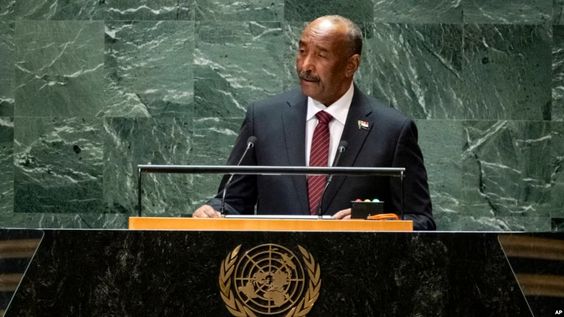Africa
Sudan’s Army Chief Favours Negotiated Peace Agreement Following War

The head of the Sudanese army claimed on Friday that during a recent regional visit, he had not requested military assistance and that a peaceful resolution to the war, which has resulted in thousands of deaths and millions of displaced inhabitants, was his preference.
Additionally, General Abdel Fattah Burhan stated in a Reuters interview that he had requested that neighbouring countries stop sending mercenaries to aid the paramilitary Rapid Support Forces.
Four years after long-time ruler Omar al-Bashir was deposed in a popular revolt, a war between the army and the RSF broke out in the middle of April over preparations for a political transition and the absorption of the RSF into the army.
“Whether via dialogue or force, every war is resolved in peace. Our preferred path is the path of discussions, and we are moving forward along those two paths, Burhan said outside the United Nations General Assembly in New York.
Burhan continued that he thought the impassed negotiations between the United States and Saudi Arabia in Jeddah might still be resolved.
Burhan spent the first several months of the war in Sudan and has since been to several other countries. Though he had requested other states to prohibit outside assistance that he claims the RSF is receiving, he emphasised that the goal was to find answers rather than military support.
“To stop the flow of mercenaries, we asked our neighbours to help us monitor the borders,” Burhan stated.
In a video statement made public on Thursday to coincide with Burhan’s address to the U.N. General Assembly, RSF leader Mohamed Hamdan Dagalo, also known as Hemedti, declared his readiness for a cease-fire and political negotiations.
Bloodshed has been stopped in the past despite assertions from both sides that they want peace and are prepared for cease-fires.
According to eyewitnesses, the army’s bombardments have resulted in civilian deaths, and the RSF is to blame for widespread theft, sexual assault, and other atrocities in addition to taking part in ethnically targeted attacks in Darfur.
On Friday, Burhan denounced criticism of the army as propaganda from its adversaries. The RSF has said it is not responsible for the bloodshed in Darfur and that it will hold its members accountable for any wrongdoing.
Burhan claimed that the army’s minimal presence in El Geneina, which saw the greatest mass executions in Darfur, made it difficult for them to react.
After the death of West Darfur’s governor on June 14, the violence reached its peak. Burhan claimed he suggested to the governor that he seek safety at a military camp, but the governor disagreed.
“The armed forces present in El Geneina are not sufficient in number to spread out in every area,” he claimed.
Reuters
